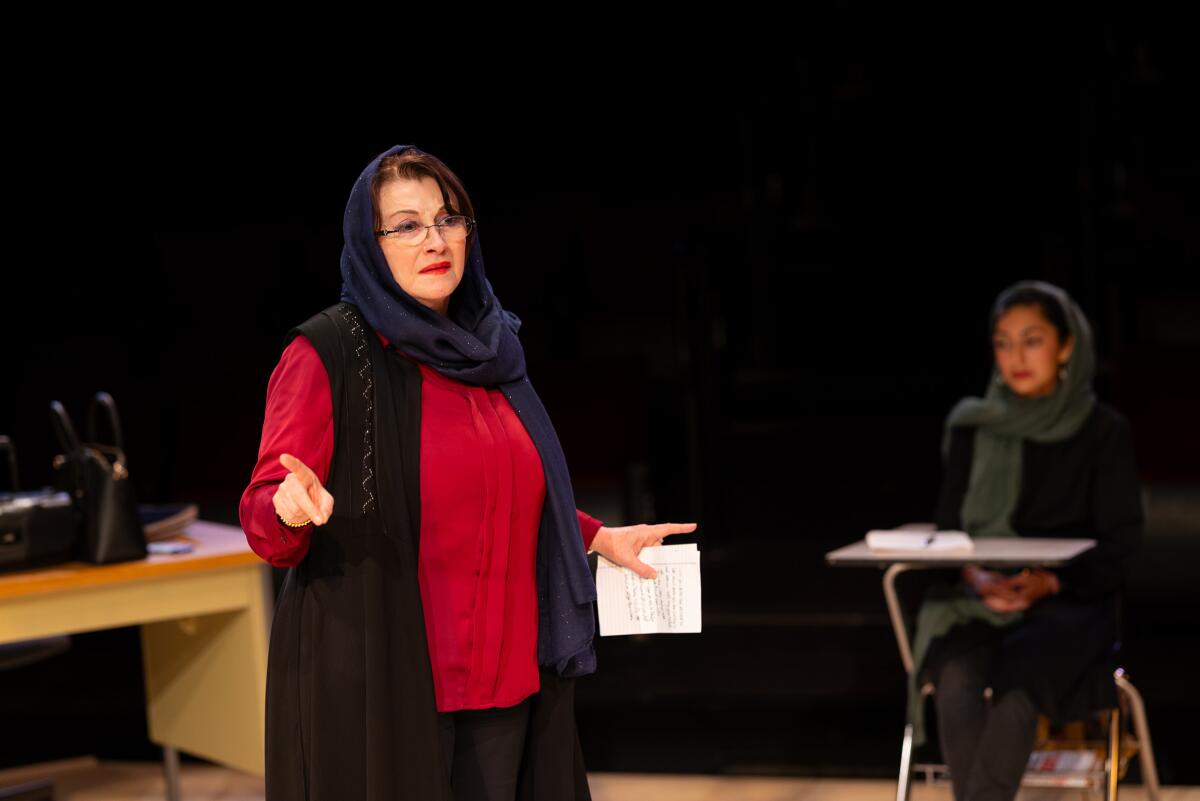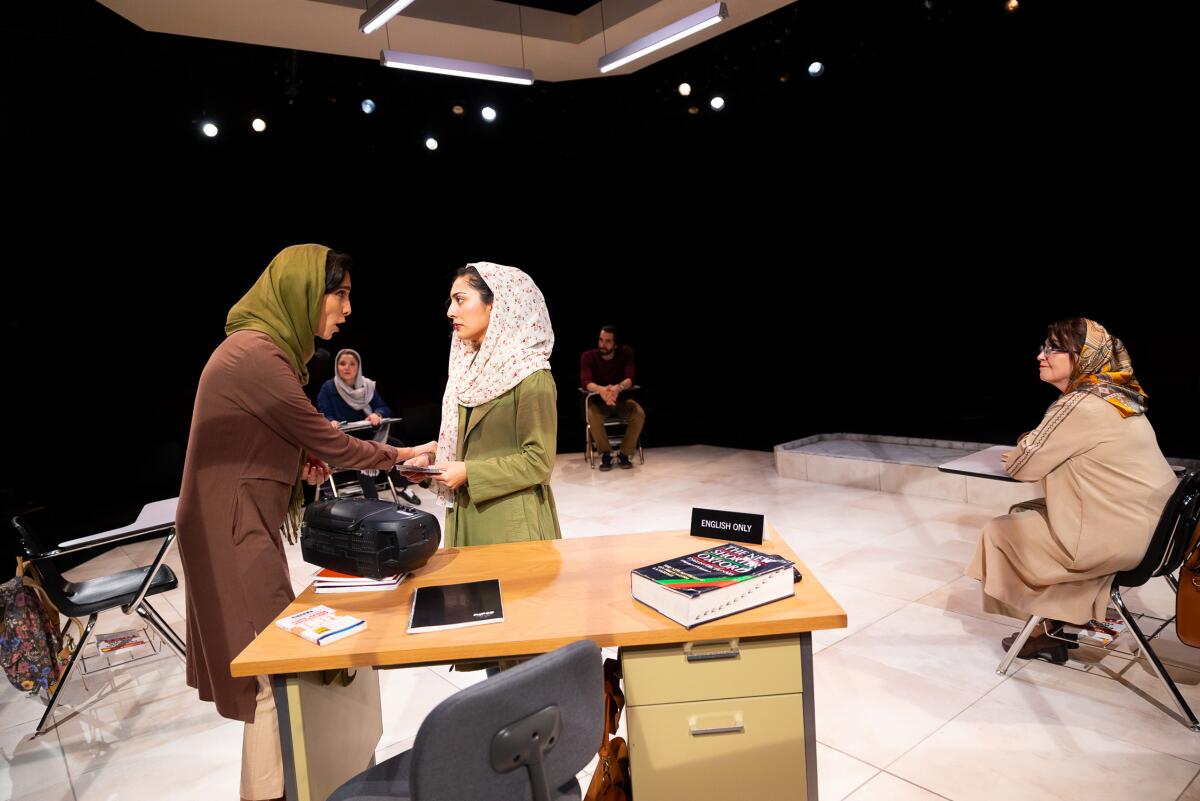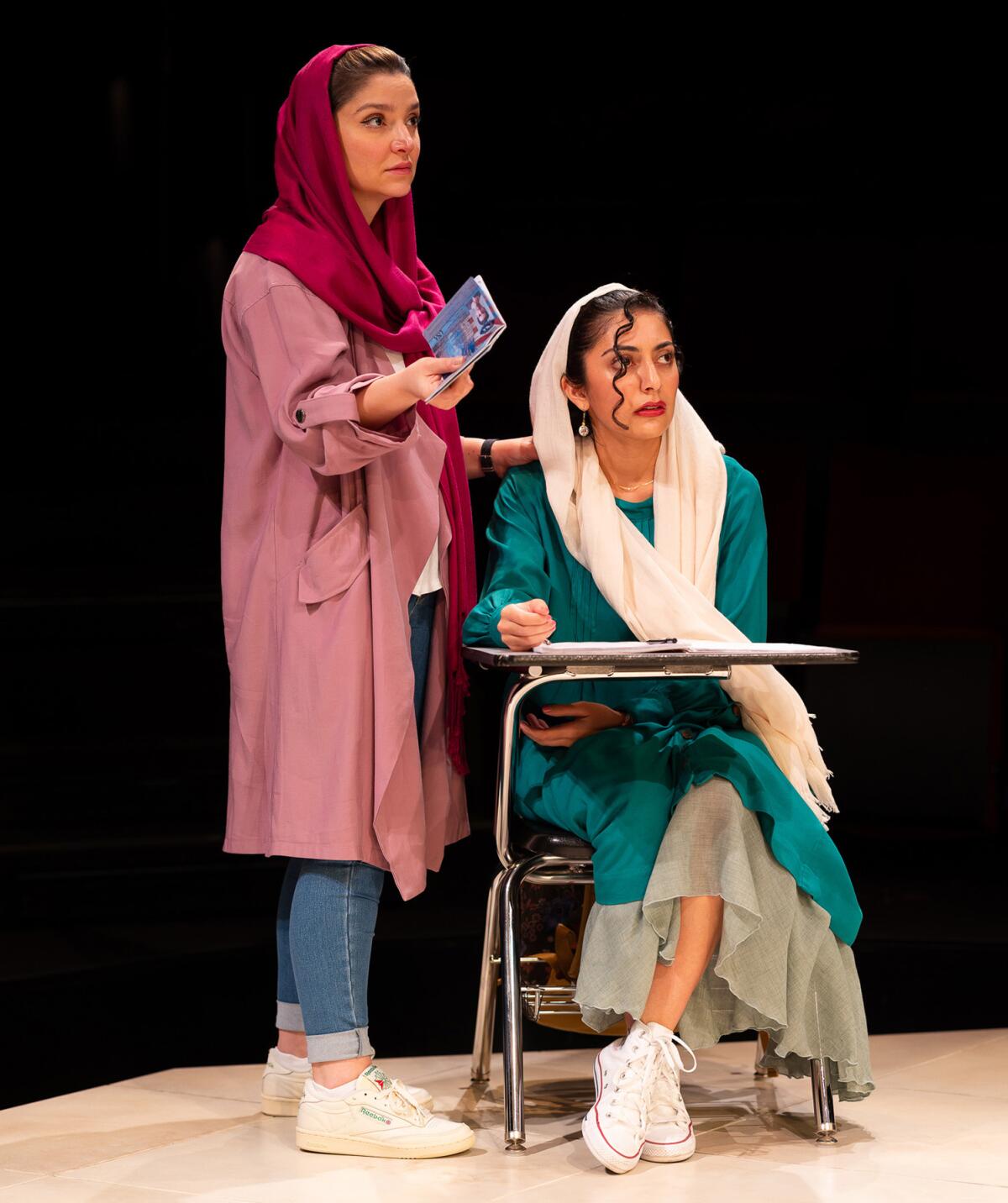A Pulitzer Prize-winning meditation on language and loss at San Diego’s Old Globe

- Share via
SAN DIEGO — “English” by Sanaz Toossi, an Iranian American playwright from Orange County, won the Pulitzer Prize for drama in 2023. Modest in scope, the play is wrought with an emotional delicacy that’s beautifully captured in Arya Shahi’s well-acted production at the Old Globe’s Sheryl and Harvey White Theatre.
The setting is a classroom in Karaj, Iran, in 2008. A small group of students have enrolled in a course to improve their English. Marjan (Pooya Mohseni), the dignified teacher who spent nine years in England and retains an affection for Hugh Grant rom-coms, insists that only English is spoken.
A sign on her desk reminds students of the rule, but they regularly break into Farsi to express complex thoughts. To represent this to an American audience, the playwright has the characters speak in unaccented English of a conversational (and occasionally profane) variety when communicating in their native tongue. Farsi is fluent English whereas their acquired English is halting and hemmed in.
The play examines what is lost and what is gained in the acquisition of a foreign language upon which so much opportunity depends. For these characters, the study of English isn’t merely an elective chosen to broaden their knowledge of the world or enhance an upcoming trip. It is the key to their future.
Roya (Mary Apick), the oldest of the students, is learning English because her son has settled in Canada and wants his daughter to grow up fully Canadian. Before grandmother can visit, she is expected to be able to speak to her granddaughter in English — a request that bewilders and aggrieves her, but one that she cannot refuse.

Goli (Ari Derambakhsh), 18 and full of youthful enthusiasm for makeup and Ricky Martin songs (two of her class show-and-tell items), wants to improve her accent so she can participate in a language that she compares to rice. “You want some rice and you make the rice whatever you want.” For Goli, English “stays on top of the water,” floating free of the burdensome depths that she feels tugging at her when she speaks Farsi.
Elham (Tara Grammy), the most competitive of the students, is frustrated by her slow progress in learning English. She has received a conditional acceptance to medical school in Australia, but the language requirement threatens to derail her plans. Her written English is excellent, but her accent, as she says after switching to Farsi, “is a war crime.”
Omid (Joe Joseph), the only man in the class, is the most fluent of the students, having grown up partly in America. His vocabulary sets him apart (“windbreaker” rolls off his tongue during a game involving articles of clothing, “whisk” and “measuring cup” when the game changes to kitchen items) and his accent is even better than Marjan’s.
Performed in-the-round on a generic classroom set by Sadra Tehrani that notes the passing of time by the rotation of desks on the stage, the play tracks the evolving classroom dynamics. Toossi is content to observe her characters without pushing them into dramatic battle. Plot lines are suggested but not aggressively pursued.
Marjan and Omid develop an affinity that seems like it could potentially blossom into romance. Elham’s aggressive demeanor turns menacing. But classroom etiquette tamps down the pyrotechnics.
The influence of Annie Baker — “Circle Mirror Transformation” is the play of Baker’s that “English” most resembles — is palpable. But Toossi is more conventional in her dramaturgy. She’s wary of politics and carefully filters what elements of the outside world are permitted in the classroom. If gender oppression in Islamic theocracy is an issue, it doesn’t appear to be top of mind for the characters of “English.”
The play opts instead for a Chekhovian wistfulness. Gently compassionate, “English” achieves a comic poignancy, but too much of the real world is left out. Brian Friel’s “Translations” shows that a play about language doesn’t have to sacrifice politics to be introspectively lyrical. Toossi seems so reluctant to impose an outsider’s view that she fails to convey a convincing insider reality.
But “English” earns an audience’s goodwill. The humanity of the characters — their fears and dreams, how they feel about the future — is revealed through humor and pathos that coexist as matter-of-factly as parts of grammar.
What’s more, the play invites discovery. Secrets are permitted. Just as no one in a real-life classroom would reveal their entire life story in a short course, the characters of “English” aren’t under any obligation to tell the truth, the whole truth and nothing but the truth about their lives.

Elham, for example, doesn’t want her classmates to know how many times she has taken the Test of English as a Foreign Language (TOEFL) and scored poorly. Roya doesn’t like it when Elham speculates on why her obsessive calls to her son in Canada keep going to voicemail.
Why Marjan returned to Iran from England is as much a mystery as the state of her marriage. Goli might be too young (and underdeveloped as a character) to pose urgent enigmas, but Omid more than makes up for the shortfall with revelations about his background that raise questions about his enrollment in the course.
The old saying about gaining a second soul when you learn a foreign language is invoked, but Toossi is perhaps even more alert to the soul you lose when you are forced to give up your native tongue. Marjan’s English-only policy at school becomes a point of conflict that opens up the play’s richest vein of thematic material.
What self can you be in Farsi that you can never be in English, and vice versa? And what about those, like Marjan and Omid, who are caught between worlds, cultures and languages? Where is home for them and how might they find relief from their chronic and confounding homesickness?
The ensemble fully inhabits these questions. And the characters, who vanish from the class as casually as they first appear, supply their own contradictory answers.
Shahi’s direction puts the focus on where it belongs — the cast. The pace of his production is studied, but the lively mix of characters keeps the tempo from feeling slack.
Mohseni’s haunting restraint communicates deeper than words Marjan’s sense of a diminishing horizon. Apick’s Roya communicates the crushing truth of maternal heartbreak in her stalwart refusal to succumb to the disappointment. Grammy’s Elham is furious without being monstrous. Derambakhsh finds hidden depths in Goli’s superficiality. Joseph’s Omid exudes a smiling reverence, but his friendliness has an opacity that grows in intrigue.
Limited in range but emotionally enlightening, the instruction resonantly conjugates the way language makes and unmakes us.
'English'
Where: Sheryl and Harvey White Theatre, The Old Globe, 1363 Old Globe Way, Balboa Park, San Diego
When: 7 p.m. Tuesdays-Thursdays, 8 p.m. Fridays, 2 and 8 p.m. Saturdays, 2 and 7 p.m. Sundays. Through Feb. 25.
Tickets: $109 (subject to change)
Contact: (619) 234-5623 or theoldglobe.org
James Urbaniak stars as an Abstract Expressionist painter with a double life in the world premiere of John Ross Bowie’s ‘Brushstroke’ at the Odyssey Theatre.
More to Read
The biggest entertainment stories
Get our big stories about Hollywood, film, television, music, arts, culture and more right in your inbox as soon as they publish.
You may occasionally receive promotional content from the Los Angeles Times.












